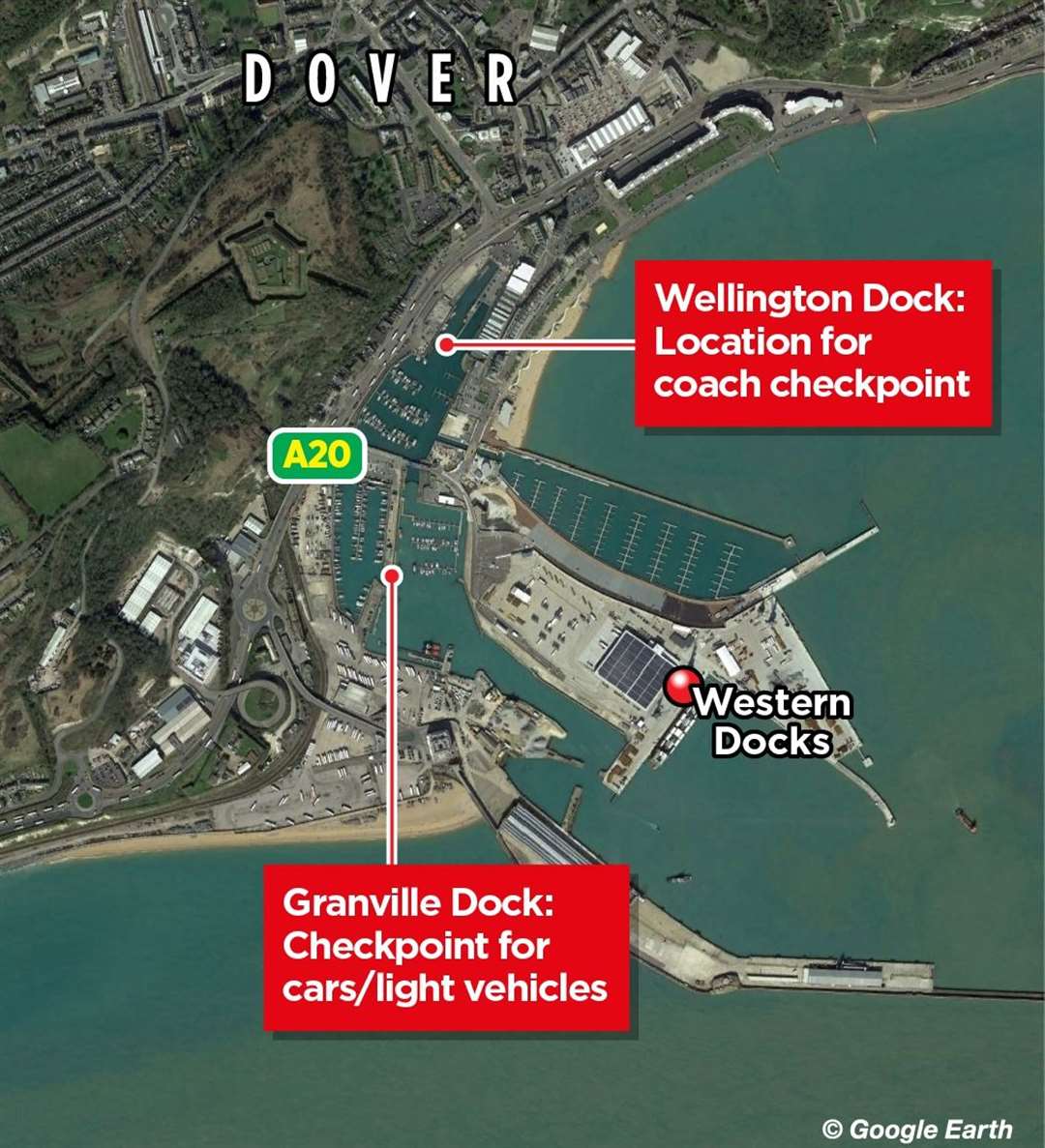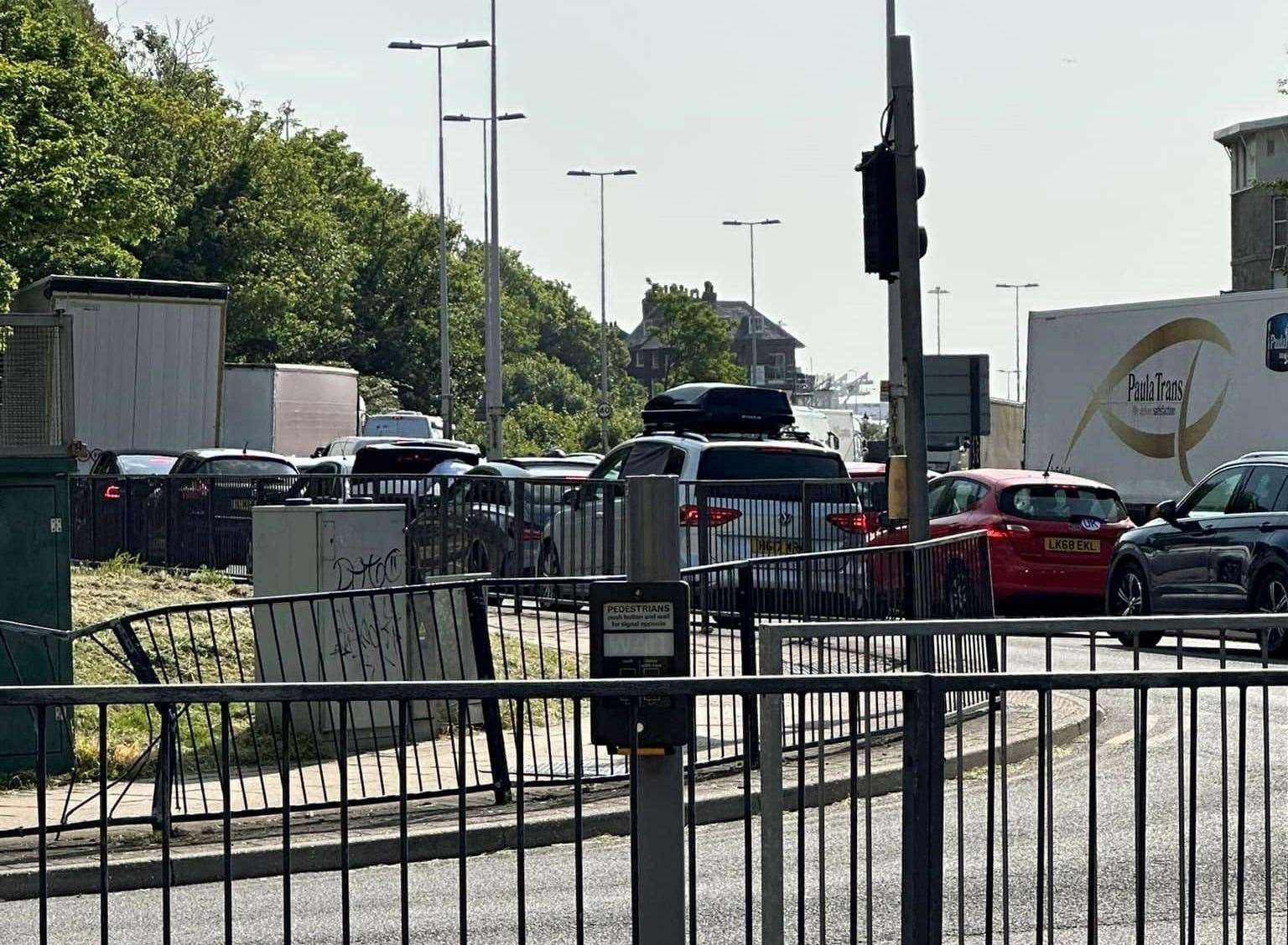Port of Dover to process coach traffic at old boatyard amid fears ‘horrendous’ gridlock could get worse under EU’s new EES rules
More space is being created for vehicle checks at Dover harbour amid concerns new EU rules could exacerbate traffic problems on Kent's roads. Delays of up to 15 hours are feared on the routes to the town's port, as well as Eurotunnel in Folkestone, after the Entry Exit System (EES) comes into force on October 6[1]. But Doug Bannister, chief executive of the Port of Dover, told a meeting this week that space is being created at a boatyard to process coaches and keep them off the road while they are waiting.
He said: "There is an old boatyard on the other side of the A20 to register coaches where we will have two facilities to register coach passengers. Coaches will get checks there. "We may also create new land through the infilling of Granville Dock for checking cars."
The coach site is aimed to be ready in time for October but the work on Granville Dock is still being considered as a plan and if it went ahead would not be in place until summer 2025.
Mr Bannister was speaking at a meeting on Tuesday night held to discuss the impact of the EES on traders at Snargate Street[2]. The road is part of the A20 route for the Eastern Docks, making it one of the first places to be clogged up with traffic during severe port delays.

He explained the port was being helped by a GBP45 million government Levelling Up grant awarded last year to ease gridlock.[3] Roads into Dover are choked several times a year already for reasons such as delays in border checks and severe weather disrupting sailings.
It also happens during holiday getaway peak times and it is feared it could happen again this Easter[4]. Last Easter saw 17 hours of queues for coaches.
Robin Burkhardt, who runs the Old Curiosity Shop antique store in Snargate Street, also spoke at the meeting held at the road's Sunrise Cafe. "Last summer was absolutely horrendous," he said.

"Sometimes when I look out of my window I see lorries back to back and you can't put a fag paper between them.
"This also adds to the problems of deliveries at St James' [retail and leisure centre off the A20] because of all the lorries. "When they are backed up it exceeds the pollution limits and as I live and work in Snargate Street I get the fumes 24 hours a day."
In the worst cases, traffic can snarl up all of Dover's roads going towards the port, including town centre ones. Dover District Council leader Kevin Mills told the meeting: "Lorries should not be coming into the town centre or Folkestone Road at all.
In the worst case scenario people can be stuck for hours."

Picture: David Joseph Wright
He said officials from outside the town should and look at the chaos as shown on the council's CCTV.
"They should bring sleeping bags because they won't be able to get out of Dover," he added. Toby Howe, tactical lead for Kent Resilience Forum, told the meeting of problems of finding places to keep waiting HGVs parked away from Dover. He said the lorry park at Sevington, Ashford[5], could not be used because it was now being used for Defra checks.
Mr Howe added that places such as Folkestone[6] and Hawkinge also had to be considered in terms of traffic congestion.

Mayor of Dover Cllr Sue Jones told KentOnline after the meeting that gridlock in the town created wider effects such as carers not being able to drive to visit patients at home. She said: "You've got people with caring responsibilities and they're trying to get to people in the community. "You can have elderly and disabled people not getting their lunch because carers can't get to them.
"I wonder if the people higher up the ladder really understand the ground roots problems that happen to people in Dover." The EES has been drawn up to register entry and exit data of non-EU nationals - which, following the Brexit vote, now includes the British - when they cross an external border of the continental bloc. With this, manual passport stamps at Kent ports are to be replaced by biometric facial imaging and fingerprinting, which has to be done in the presence of an officer.

It is feared that the time taken on tourists' first entry to the European Union could increase significantly under the new rules.
In written evidence to Parliament's European Scrutiny Committee in January, Ashford Borough Council said a "reasonable worst case" scenario could see 14-hour delays[7] at the Port of Dover if the scheme is implemented as currently planned. The EU argues it will "replace the current system of manual stamping of passports, which is time-consuming, and does not provide reliable data on border crossings and does not allow a systematic detection for over-stayers". Everything you need to know about the EES, by KentOnline political editor Paul Francis
New arrangements for travellers from the UK going to countries in the European Union could lead to gridlocked roads and delays of up to 15 hours, it has been claimed. So, what are these new checks - which have already been delayed three times - and why are they being introduced? Political editor Paul Francis answers the key questions and examines if the new entry-exit arrangements will create yet more congestion, disruptions and delays.
Why are we having a new system of checks and who is behind the arrangements? Proposals have been drawn up by the European Union, which claims that under the arrangements for 'exit and entry', travellers from non-EU countries - like the UK - will benefit from increased automation at border controls. The technology is also claimed to help when it comes to detecting fraud and visitors who overstay.
The current system of manual stamping of passports which is time-consuming, does not provide reliable data on border crossings. Is this to do with Brexit? Partly, but not exclusively.
Once the UK opted to leave the EU, it became a country that no longer enjoyed the benefits of belonging to the EU and the free movement of travel across borders. Which countries will be affected? The system will apply when travellers from outside the EU enter 25 EU countries - all member states apart from Cyprus and Ireland - and four non-EU countries (Norway, Iceland, Switzerland and Lichtenstein) that are part of the border-free Schengen area.
Travellers from non-EU countries will, under the system, have their names and travel documents registered along with biometric tests - and the date and place of entry and exit. Manual stamping of passports, considered to be too time-consuming, will end. How will travellers register their details?
It's not 100% clear but there are likely to be kiosks at the Channel ports where you will enter your details before travelling. These self-service kiosks will register the person's name, type of travel document, biometric data (ie fingerprints and captured facial images) and the date and place of entry and exit. If these checks are said to be more efficient and less time-consuming, why are we hearing so much about delays?
The claims of prolonged waits of up to 15 hours are largely down to the concerns about when the scheme actually starts. The controls require people entering the EU to register their fingerprints and a photograph alongside their passport. Imagine the numbers who travel across the English channel on a daily basis - even higher during school holidays - who, if they have not been able to register remotely, are likely to find themselves in queues very quickly.
The 15-hour forecast came from Kent County Council and Ashford Borough Council while Eurostar has been equally downbeat, especially over the likely queues at St Pancras. Eurotunnel says managing the new system in real-time would require an enormous expansion in the number of people conducting border controls and an enormous expansion in the number of available booths, neither of which is possible in the space constraints of the Channel Tunnel. Can't the checks be done while cars are queueing to board a ferry?
Not according to the Port of Dover. Peers examining the system were told by Tim Reardon, the port's head of EU Exit: "There is no way yet of doing a biometric control on a vehicle without getting people out of the vehicle. That is one thing on our site that cannot happen because it is in the middle of live traffic.
"It is the equivalent of asking people to get out of their car at a motorway toll booth. It is fundamentally unsafe." Isn't there supposed to be an app for people to input their details and documents remotely?
There is - only it's not going to be ready in time for October. What does the government have to say about the new arrangement and claims that the Channel ports won't be able to cope? It is actually quite bullish about the new arrangements but the room for additional capacity at the Port of Dover is already limited.
Downing Street sought to downplay the risks of delays.
A No 10 spokesperson told KentOnline: "On some of those scenarios, rightly we're not going to get into hypotheticals about delays ... but there are tried and tested contingency plans in place and a lot of work is managed by the Kent Resilience Forum so we will make sure we're prepared and our focus remains on ensuring the scheme does not unnecessarily impact local communities or result in delays for travellers.
"We are working very closely as you would expect with the French, with all the port authorities, to ensure that travellers and passengers do not experience unnecessary delays - that work continues."
References
- ^ comes into force on October 6 (www.kentonline.co.uk)
- ^ the impact of the EES on traders at Snargate Street (www.kentonline.co.uk)
- ^ awarded last year to ease gridlock. (www.kentonline.co.uk)
- ^ it could happen again this Easter (www.kentonline.co.uk)
- ^ Ashford (www.kentonline.co.uk)
- ^ Folkestone (www.kentonline.co.uk)
- ^ 14-hour delays (www.kentonline.co.uk)